Africa Oil (OTCPK:AOIFF) (TSX:AOI:CA) announced a deal to issue enough shares in exchange for the rest of the interest in Prime that it does not already own. For existing shareholders, the most immediate result will be a significant increase in the dividend.
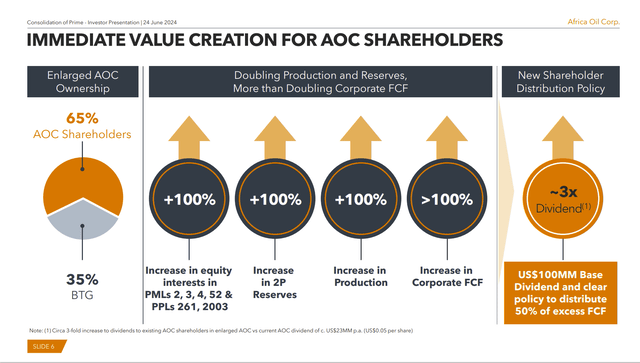
Africa Oil Summary Of Prime Interest And New Dividend Policy (Africa Oil Acquisition Of Prime Interest Presentation June 24, 2024)
There will also be some free cash flow returned to shareholders. That will bring the newly constituted company in line with a lot of industry competitors.
Prime Financials
The latest financial summary for Prime was reported by Africa Oil in the first quarter:
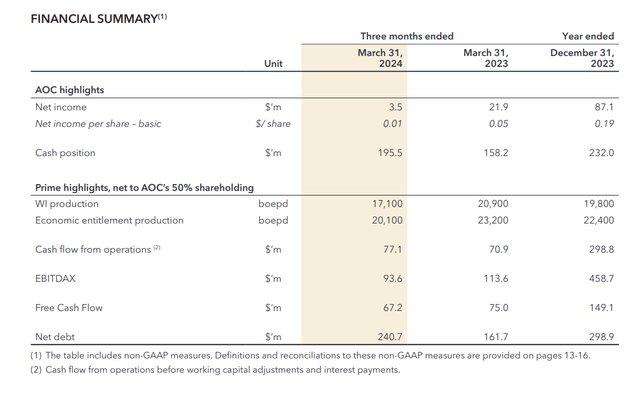
Africa Oil Summary Of Interest In Prime (Africa Oil First Quarter 2024, Earnings And Management Discussion Filed With Sedar)
Additionally, the website shows roughly 452 million shares outstanding at the end of the first quarter. If the new shareholder were to own 35% of the outstanding shares after this is completed, then BTG will receive roughly 243 million shares. (Note that this is not taking into account any adjustment for share repurchases or any contractual adjustments. Instead, this is meant to be a rough overview). Those additional shares turn out to be about 53% more shares that result in a doubling of cash flows. As an accountant (right now) I love the deal from that aspect.
At the current price of the stock, it would appear that management is gaining control of more EBITDA and cash flow at a price of very roughly one times EBITDA. That means there should be a very fast payback on this combination for shareholders.
There may additionally be a gain in that Prime was holding cash, as was Africa Oil. That situation may well become more efficient as well to result in a one-time working capital reduction through the use of less cash on the balance sheet.
BTG Pactual Largest Shareholder
Many may remember when the company was a Lundin Group company. But the Lundin Group effectively exited their interest. Now the company is picking up a major shareholder with some energy experience that may boost future prospects.
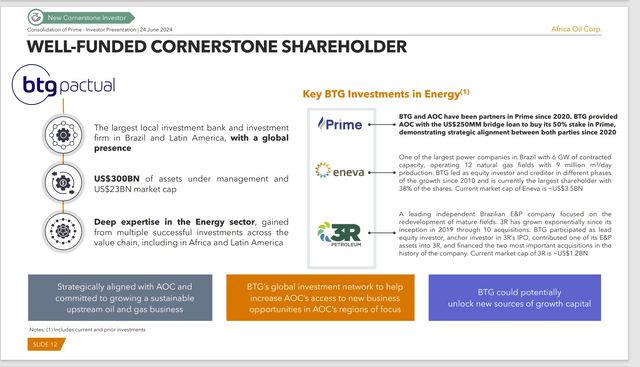
Africa Oil Summary BTG Pactual Experience (Africa Oil Acquisition Of Prime Interest Not Already Owned Presentation June, 2024)
The company will now have an investment bank as a major shareholder. This could open up growth opportunities for the company that it could not do on its own. As was mentioned in the presentation, BTG made it possible for the original acquisition of an interest in Prime in the first place.
The combination likely marks a significant growth spurt as the company continues to transition from an “idea” or exploratory stage company that had no source of income to one with substantial operations.
Note that for a company with operations offshore, this is one very small offshore operator that has small interests in some very large projects. So far, this operator has managed the offshore risk very well. BTG Pactual likely adds to that very important risk assessment experience.
Few companies have got as far as this one has so far. Even fewer still manage to grow into substantial offshore operators that survive a very risky business that constantly requires a fairly large of amount of money just to get started.
Growth Ahead
The combined company is probably in better shape to fund future offshore growth than is the case for two individual companies that need to keep separate books, with the subsidiary effectively an independent entity as well.
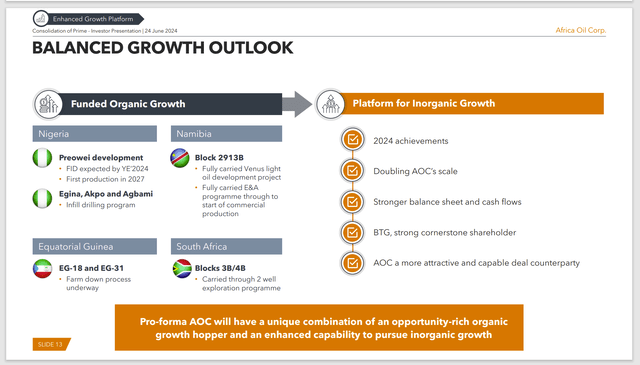
Africa Oil Post Combination Prospects (Africa Oil Acquisition Of Prime Interest Not Already Owned Presentation June, 2024)
The way the company has grown is through farm-downs. That has made several growth projects viable. But it also means giving up some interests in the process.
This combination could well speed up the growth process to allow the company to have the cash to participate in some of these projects without the need to sell some of the interests to an operator in the future.
Based upon the fiscal year 2023 numbers and the drilling underway, the post combination EBITDAX has a good chance to hit $1 billion per year. That may be enough to participate in some future projects when the interest is small enough without worrying about having to borrow money or sell part of an interest as the price for participating.
So far, management has basically cleared up any cash needs for a good number of growth projects for a few years.
BTG Pactual Agreement
There is a standstill agreement with BTG. For shareholders, the immediate concern is that BTG will not be selling shares for two years. Therefore, shares trading volume is unlikely to change much and there may not initially be a post combination pricing weakness.
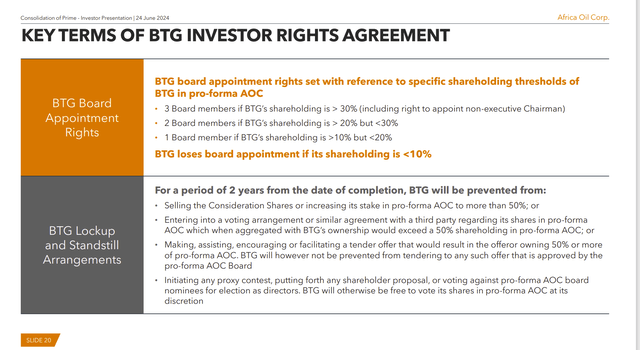
Africa Oil Standstill Agreement Highlights With BTG (Africa Oil Prime Interest Acquisition Presentation June, 2024)
Shareholders should understand that with about one-third of the shares outstanding, BTG has the votes to effectively control the company. The fact that they are effectively backing current management as part of the agreement is a big vote of confidence in the current management by a large shareholder with some industry experience.
At least at the start, this newly effective combination appears to be off to a good start.
Summary
Financially, the post combination company appears to be off to a conservative financial beginning:
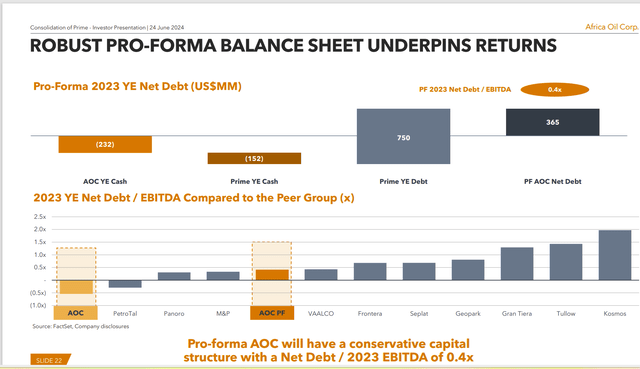
Africa Oil Post Acquisition Balance Sheet Debt Ratio Guidance (Africa Oil Prime Interest Acquisition Presentation June 2024)
While that ratio may stay the same, look for the company to work with its lenders to reduce financial duplication and use some of that cash to repay debt and save on interest costs.

Africa Oil Objectives Achieved Or Advanced Through The Proposed Acquisition (Africa Oil Prime Interest Acquisition Presentation June 25, 2024)
In general, Africa Oil becomes a larger company with more free cash flow that is better able to participate in offshore projects.
The current cash flow comes from a fairly risky source, as Nigeria has a helpful environment. But the government is not all that effective. Being in the offshore part of the Nigerian industry with a major company as the operator helps the situation immensely.
However, more value will likely come from additional sources of income from projects in Namibia and South Africa, where the business achieves a likely higher valuation. Clearly the current business is necessary to provide badly needed cash flow to invest in a more favorable (and probably more liquid) situation.
This company has to be regarded as a speculative opportunity with darn good management that has navigated a near impossible transition to cash flow and operating production. Some of the projects that will hopefully provide future cash flow should reduce some of that risk one way or another.
The benefits of BTG as a shareholder remain to be seen. But there is no doubt that BTG has been helpful to the company so far. If that keeps up, Africa Oil could see material opportunities for solid growth of the cash flow in the future.
Risks
The only source of income for Africa Oil is in the form of production in Nigeria. Nigeria has a helpful environment, but the government is ineffective. Now the offshore business is at least partially and maybe mostly insulated from the onshore challenges. But the fast paybacks evidenced by the low purchase price indicate a level of business risk that would make it speculative.
Both management and BTG appear to be on the same page in regard to the company business strategy and future. Should an unresolved disagreement break out, it could harm both current and future prospects.
Any upstream company is subject to the volatility and low visibility of commodity prices in the industry. A severe and sustained downturn can do serious damage to the company prospects and even cause the current deal to unwind or to look unwise.
The loss of key personnel can set back company prospects materially.
Editor’s Note: This article discusses one or more securities that do not trade on a major U.S. exchange. Please be aware of the risks associated with these stocks.
Read the full article here











Leave a Reply